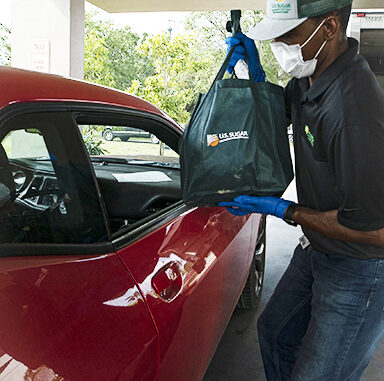
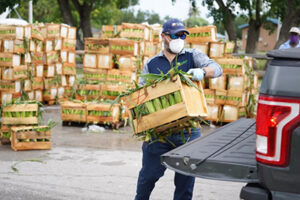
(Part 2)
“In times like these, it’s always important to know that there are people that really care; it’s not about lip service it’s about what I can do to help the folks in the glades. U.S. Sugar has made that commitment to us so we are appreciative of that.” –Steve Wilson Mayor Belle Glade
By Bobby R. Henry, Sr.
In this second part of a three part series, ‘There’s More Burning on the Muck than Sugarcane’, we will read about some of U.S. Sugar’s community involvement in the Glades.
As I continued my tour along with Judy Sanchez, Ryan Duffy and Brannan Thomas of U.S. Sugar, to my surprise I found out that not only does U.S. Sugar farms grow sugarcane, they also farm sweet corn, green beans, watermelons, peanuts as well as some leafy green vegetables, plants and sod.
There are more farms other than just sugarcane farms, rice is even grown in some areas.
It is with these farms and local vendors that U.S. Sugar has been able to weather different storms and natural disasters to help those in need who they consider as family.
In their Neighbors Helping Neighbors outreach efforts, one of the mottos of their founder Charles Stewart Mott, guides them in there service to the community, “what is good for our our community will be good for our company”.
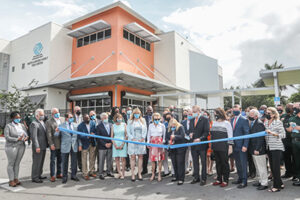
They do feed, clothed and educate the community through their philanthropic activities.
How many of you know about the Industrial Skills Training Academy (ASTA)? Well, it’s a three-year on-site training program housed right on the refinery complex. The students have to go through an intense selection process that is offered to students in the Glades, and once they’re recruited and successfully complete the required training they will become a part of the workforce.
As the pandemic grew and the entire country was affected from food shortages and other life threatening perils, U.S. Sugar’s program Neighbors Helping Neighbors and their partners were right there ready to in jump in to help where needed and in some instances to forge new ventures.
The farmers never stop working; they continue to feed and give out needed supplies along with their partners. When grocery stores were empty, the farmers continue to work in the fields to supply food.
U.S. Sugar staff and volunteers were there passing out hot meals, mask, school bags and other essential items to help during the pandemic.
I wanted to hear from someone who was homegrown, employed by U.S. Sugar at an administrative position and Black so I turned to Brannan Thomas, the Community Relations Manager.
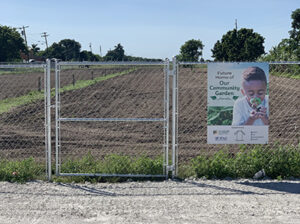
What would he say that supported the community’s needs and concerns? What are his responsibilities and what has he done in his position to foster better access for the community?
Brannan: In my role as Community Relations Manager, I am responsible for working with all of the community organizations, leaders and individuals we partner with throughout South Florida. Our Glades farming communities are close-knit, and as a product of the Glades (born in Pahokee, raised in Belle Glade and an ’03 graduate of Glades Day School), I am proud to be involved in the communities with so many of my friends, family, and former classmates, teammates and neighbors.
My role with the Company is primarily responsible for coordinating our public tours, philanthropic contributions, and coordinating volunteer efforts/community engagement. For the past couple of years as our state and nation have continued to recover from COVID-19, I have been heavily focused on setting up regular produce and hot meal distributions, partnering with local restaurants, churches, schools, and other community organizations. Some of the most fulfilling work I have been involved in is helping to lead community projects, such as the recent donation of new uniforms to the Rosenwald Elementary School’s drumline in South Bay, the refurbishment of the Clewiston Youth Center, the development of a new community garden in Harlem, and the ground-breaking of the new youth center for the Boys & Girls Club in Belle Glade. All of these projects bring many of our community partners together in different ways.
“I am also proud to serve on many boards and in service organizations including Boys and Girls Club of Palm Beach County, Belle Glade Rotary, the Clewiston Chamber of Commerce, Clewiston Sugar Festival, and many more. U.S. Sugar’s founder, Charles Stewart Mott, always said, “If you take care of the community, you take care of the company.” My daily work– which includes not only Clewiston and the Glades Communities where we farm but also stretches coast to coast as we consider “our” neighbors all those areas where our people live, work and play—is a testament to that.
“Brannan is trustworthy and respected by the community not only because he grew up here, he went away to college and chose to come back and raise his family here and he makes sure that our communities are benefactors of the hard workers who look like us”, said Janet B. Taylor well respected freedom fighter and advocate for Glades Lives Matter.
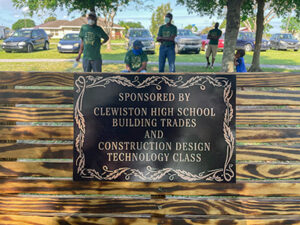
Harlem, an area that Black residents/workers lived in as what we would probably considered to be workforce houses today. The Harlem Community was established in 1931, the same year U.S. Sugar was founded. In establishing this neighboring community, U.S. Sugar provided the housing lots (on land previously use in farming) so more local people could have homes. The company has maintained a very positive relationship with the people of Harlem over the years, also providing land for a community park, the Harlem Civic Center, library and other amenities such as playgrounds and youth sports facilities. Several years ago, Harlem was named Outstanding Small Community of the Year.
Otis Davis one of the first Black police officers for the city of Miami use to live in Harlem and reflected on its beginning. “Before Harlem was there it was just land owned by the Sugar Mill that used to rent rooms and then after a while they sold lots. My mother and my aunt brought lots but they rented rooms first and then they were able to purchase lots to build in Harlem.”
In all the good that U.S. Sugar does there is still room for improvement. With more inclusion, comes the greatest prospects for progress.
Next article, “let’s see what the community has to say”.


Be the first to comment